Related Research Articles
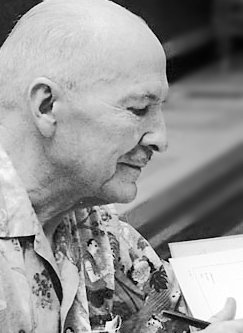
Robert Anson Heinlein was an American science fiction author, aeronautical engineer, and naval officer. Sometimes called the "dean of science fiction writers", he was among the first to emphasize scientific accuracy in his fiction, and was thus a pioneer of the subgenre of hard science fiction. His published works, both fiction and non-fiction, express admiration for competence and emphasize the value of critical thinking. His plots often posed provocative situations which challenged conventional social mores. His work continues to have an influence on the science-fiction genre, and on modern culture more generally.
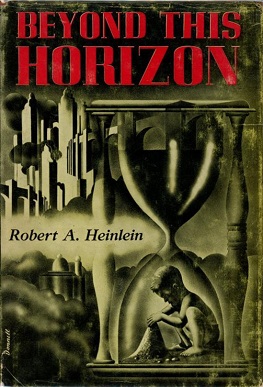
Beyond This Horizon is a science fiction novel by American writer Robert A. Heinlein. It was originally published as a two-part serial in Astounding Science Fiction and then as a single volume by Fantasy Press in 1948. It was awarded a Retro-Hugo award for best novel in 2018.

Damon Francis Knight was an American science fiction author, editor, and critic. He is the author of "To Serve Man", a 1950 short story adapted for The Twilight Zone. He was married to fellow writer Kate Wilhelm.
"Coventry" is a science fiction short story by American writer Robert A. Heinlein, part of his Future History series. It was first published in the July 1940 issue of Astounding Science Fiction, and later collected into the book Revolt in 2100 in 1953. The title is inspired by the British idiom "to send someone to Coventry". In 2017, the story won the Prometheus Hall of Fame award.

Apocalyptic and post-apocalyptic fiction is a subgenre of science fiction in which the Earth's civilization is collapsing or has collapsed. The apocalypse event may be climatic, such as runaway climate change; astronomical, such as an impact event; destructive, such as nuclear holocaust or resource depletion; medical, such as a pandemic, whether natural or human-caused; end time, such as the Last Judgment, Second Coming or Ragnarök; or any other scenario in which the outcome is apocalyptic, such as a zombie apocalypse, cybernetic revolt, technological singularity, dysgenics or alien invasion.

Eric Frank Russell was a British writer best known for his science fiction novels and short stories. Much of his work was first published in the United States, in John W. Campbell's Astounding Science Fiction and other pulp magazines. Russell also wrote horror fiction for Weird Tales and non-fiction articles on Fortean topics. Up to 1955 several of his stories were published under pseudonyms, at least Duncan H. Munro and Niall(e) Wilde.

Sexual themes are frequently used in science fiction or related genres. Such elements may include depictions of realistic sexual interactions in a science fictional setting, a protagonist with an alternative sexuality, a sexual encounter between a human and a fictional extraterrestrial, or exploration of the varieties of sexual experience that deviate from the conventional.
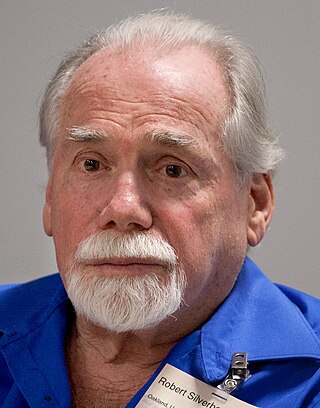
Robert Silverberg is an American author and editor, best known for writing science fiction. He is a multiple winner of both Hugo and Nebula Awards, a member of the Science Fiction and Fantasy Hall of Fame, and a Grand Master of SF. He has attended every Hugo Award ceremony since the inaugural event in 1953.

True Names is a 1981 science fiction novella by American writer Vernor Vinge, a seminal work of the cyberpunk genre. It is one of the earliest stories to present a fully fleshed-out concept of cyberspace, which would later be central to cyberpunk. The story also contains elements of transhumanism.

Lilith's Brood is a collection of three works by Octavia E. Butler. The three volumes of this science fiction series were previously collected in the now out-of-print omnibus edition Xenogenesis. The collection was first published under the current title of Lilith's Brood in 2000.

"A Martian Odyssey" is a science fiction short story by American writer Stanley G. Weinbaum originally published in the July 1934 issue of Wonder Stories. It was Weinbaum's second published story, and remains his best known. It was followed four months later by a sequel, "Valley of Dreams". These are the only stories by Weinbaum set on Mars.
"Fondly Fahrenheit" is a science fiction short story by American writer Alfred Bester, first published in the August 1954 issue of The Magazine of Fantasy & Science Fiction.
Tweel is a fictional extraterrestrial from the planet Mars, featured in two short stories by Stanley G. Weinbaum. The alien was featured in A Martian Odyssey, first published in 1934, and Valley of Dreams four months later. Weinbaum died of lung cancer soon after, and a third installment in the series never saw fruition. Tweel remains one of the most recognised aliens in early science fiction, and is said to be an inspiration for aliens in the works of Isaac Asimov and Arthur C. Clarke.

The Windup Girl is a biopunk science fiction novel by American writer Paolo Bacigalupi. It was his debut novel and was published by Night Shade Books on September 1, 2009. The novel is set in a future Thailand and covers a number of contemporary issues such as global warming and biotechnology.

Susanna Mary Clarke is an English author known for her debut novel Jonathan Strange & Mr Norrell (2004), a Hugo Award-winning alternative history. Clarke began Jonathan Strange in 1993 and worked on it during her spare time. For the next decade, she published short stories from the Strange universe, but it was not until 2003 that Bloomsbury bought her manuscript and began work on its publication. The novel became a best-seller.
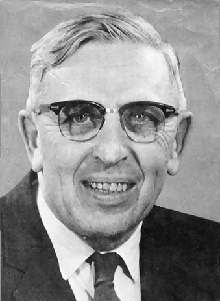
Clifford Donald Simak was an American science fiction writer. He won three Hugo Awards and one Nebula Award. The Science Fiction Writers of America made him its third SFWA Grand Master, and the Horror Writers Association made him one of three inaugural winners of the Bram Stoker Award for Lifetime Achievement. He is associated with the pastoral science fiction subgenre.
"The Plattner Story" is a short story by English writer H. G. Wells, first published in 1896 in The New Review. It was included in The Plattner Story and Others, a collection of short stories by Wells first published in 1897, and in The Country of the Blind and Other Stories, a collection of his short stories first published in 1911. In the story, a man recounts his experiences in a parallel world, which he speculates is some form of Afterlife.

Dave Hutchinson is a science fiction writer who was born in Sheffield in England in 1960 and read American Studies at the University of Nottingham. He subsequently moved into journalism, writing for The Weekly News and the Dundee Courier for almost 25 years. He is best known for his Fractured Europe series, which has received multiple award nominations, with the third novel, Europe in Winter, winning the BSFA Award for Best Novel.
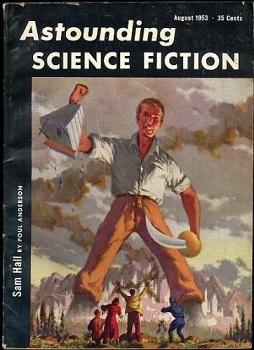
"Sam Hall" is a science fiction novelette by Poul Anderson, first published in Astounding Science Fiction in August 1953.
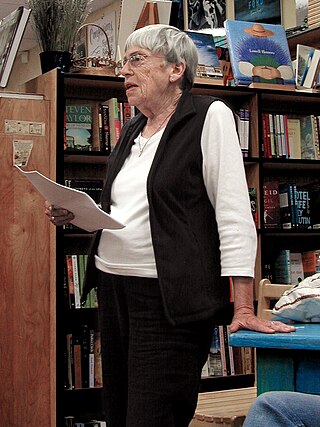
"Old Music and the Slave Women" is a science fiction story by Ursula K. Le Guin. It was first published in the 1999 collection Far Horizons, edited by Robert Silverberg, and anthologized multiple times in collections of Le Guin's works. The story is set on the planet of Werel in the fictional Hainish universe, created by Le Guin. That planetary system is also the setting for Le Guin's 1995 story suite Four Ways to Forgiveness. The economy of Werel is based on slavery, and during the period in which the stories are set, the society is experiencing upheaval and revolution.
References
- ↑ Index to Science Fiction Anthologies and Collections
- ↑ Reviews: Yesterday's Tomorrows: Robert Silverberg's The Science Fiction Hall of Fame, reviewed by Colin Harvey, at Strange Horizons ; published March 15, 2004; retrieved June 19, 2021
- ↑ Situation Normal, by John Derbyshire; originally published June 11, 2001 at National Review ; retrieved July 3, 2014